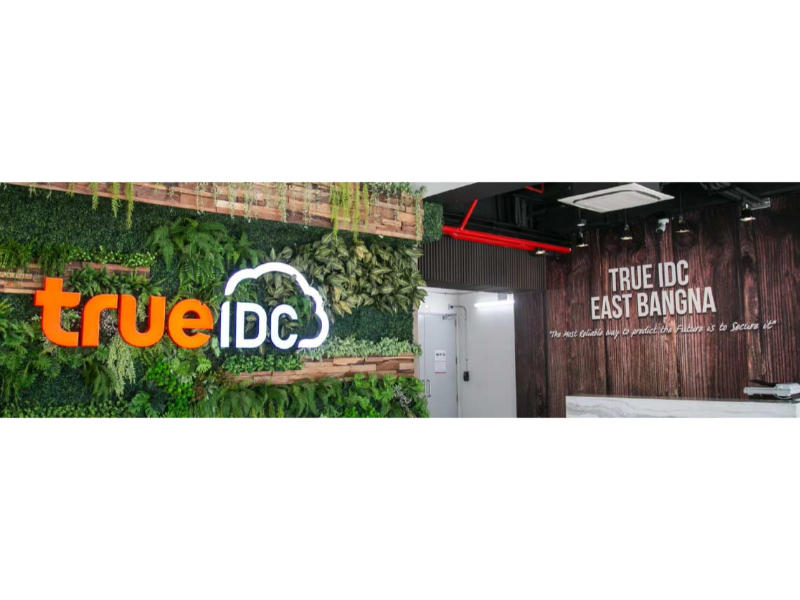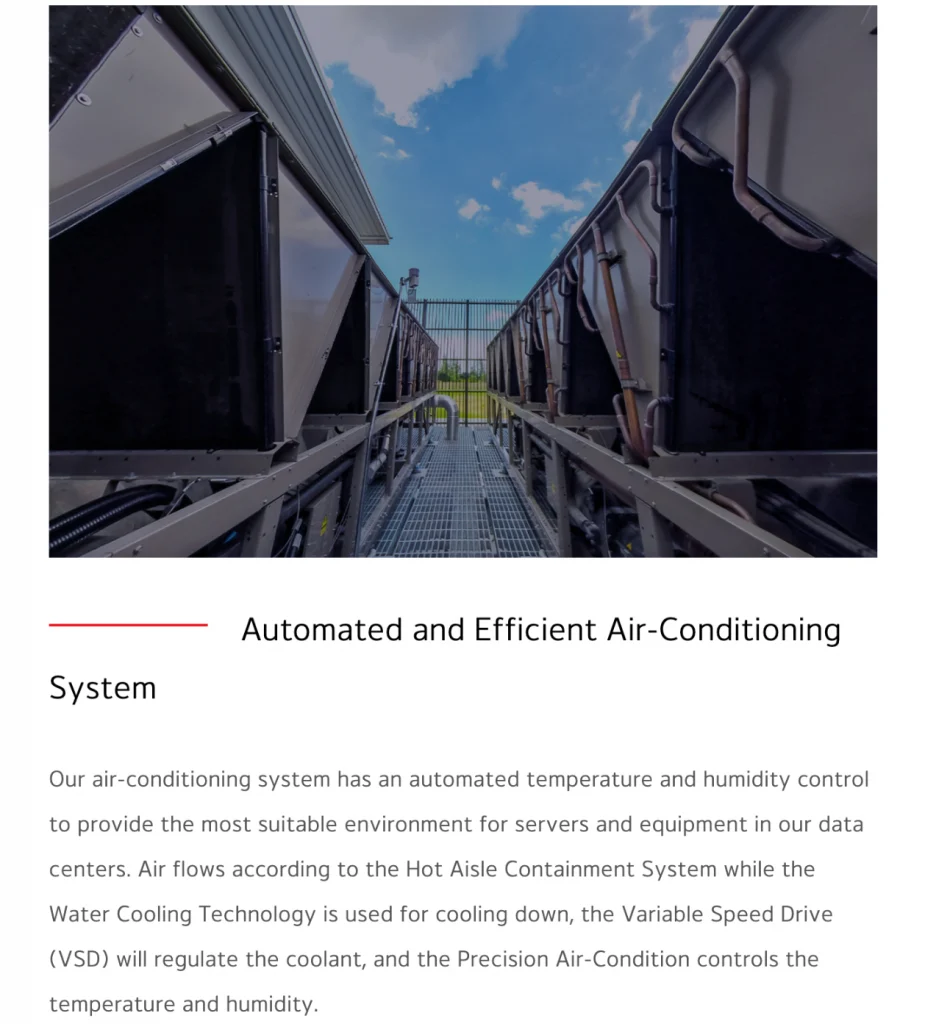- True IDC commits over 10 billion baht ($280 million) to expand its data centre and cloud services in Thailand from 2024 to 2027, specifically to meet the increasing demand for AI computing.
- Expansion plans include enlarging True IDC East Bangna Campus and True IDC North Muangthong to accommodate hyperscale businesses and OTT providers, adhering to Uptime and TIA-942 standards.
- Meanwhile, True IDC works on sustainability projects to transition to green data centres, integrating LEED practices and renewable energy sources like wind, biofuel cells, and solar power.
True Internet Data Center Company Limited, known as True IDC, commits over 10 billion baht ($278 million) to expand its data centre and cloud services in Thailand. The investment, spanning 2024 to 2027, focuses on enhancing infrastructure, sustainability, and operational excellence.
Also read: VIRTUS to build 100% renewable energy data centre in Buckinghamshire, UK
Also read: Amazon pays $650 million for a nuclear-powered data centre
Becoming the largest data centre in Thailand

True IDC will enlarge its True IDC East Bangna Campus and True IDC North Muangthong facilities to accommodate hyperscale businesses, OTT providers, and tech firms entering Thailand and ASEAN. With over 60,000 square meters of space, the centres will adhere to Uptime and TIA-942 standards, offering flexible setups, increased electricity capacity, and carrier-neutral networks.
The Uptime Institute‘s standards focus on data center design, construction, and operation, aiming to maximize uptime and reliability. These standards categorize data centers into tiers based on their infrastructure’s reliability and fault tolerance.
On the other hand, TIA-942 standards, established by the Telecommunications Industry Association (TIA), provide guidelines for the design and implementation of data centers, specifying requirements for cabling, network architecture, and other infrastructure elements to ensure reliability and performance.
Power efficiency and liquid cooling for AI computing
AI computing, especially with deep learning algorithms, currently demands significant computational power. Data centers play a crucial role in AI computing as they host the infrastructure required to store, process, and analyze vast amounts of data used in AI workloads. Power capability and liquid cooling are highly relevant to data centers.
Power capability refers to the capacity of a computing system to handle the high power requirements of AI workloads efficiently. This includes not only the raw electrical power that the system can consume but also its ability to manage and distribute power effectively to various components such as CPUs, GPUs, accelerators, and memory.
For AI computing, power capability is crucial for achieving optimal performance and scalability. High-power systems can process complex AI models faster, enabling quicker training and inference times. Moreover, efficient power management helps in controlling operational costs and minimizing energy consumption, making AI solutions more sustainable.
Also read: Microsoft hires former Meta exec to bolster AI supercomputing team
Traditional air cooling methods may struggle to dissipate the heat generated by high-performance AI computing systems effectively. Liquid cooling, also known as water cooling, is an alternative cooling solution that involves circulating liquid coolant through channels or pipes to absorb and transfer heat away from components.

Water cooling offers several advantages over air cooling, especially for AI computing:
- Improved heat dissipation: Liquid coolant has a higher heat capacity and thermal conductivity than air, allowing it to absorb more heat from components efficiently.
- Uniform cooling: Liquid cooling systems can provide more uniform temperature distribution across components, preventing hot spots and ensuring consistent performance.
- Noise reduction: Liquid cooling systems tend to operate quieter than traditional air cooling solutions, making them suitable for environments where noise is a concern, such as data centers or research labs.
- Higher overclocking potential: Liquid cooling can enable higher overclocking potential for CPUs and GPUs, allowing for increased performance in AI workloads.
By implementing liquid cooling solutions in data centers, AI computing systems can maintain optimal operating temperatures, thereby improving performance, reliability, and longevity while also potentially reducing energy consumption compared to traditional cooling methods.
Also read: Digital Realty launches high-density colocation for AI workloads
Taking sustainability to the next level
Simultaneously, True IDC embarks on sustainability projects to transition to green data centres. It integrates the Leadership in Energy & Environmental Design (LEED) practices, eco-friendly construction materials, and renewable energy sources like wind and solar power. Electric vehicle charging stations powered by solar panels will promote clean energy usage.
Also read: Google invests $1 billion in green UK data centre
International standard operational excellence
True IDC has outlined a strategic focus on elevating the operational excellence of its data centers. The company is committed to integrating Artificial Intelligence Data Center Infrastructure Management (AI DCIM) software, which will collaborate with IoT devices and smart sensors to effectively capture and process data from diverse equipment. This integration enables real-time monitoring and centralized analysis, thereby bolstering oversight and facilitating the maintenance of an optimal temperature within the data center. As a result, it ensures the smooth operation of high-heat generating equipment.
By aligning the entire data center operation with the Uptime Institute’s Tier III Gold standard, True IDC distinguishes itself as the exclusive provider in Thailand and Indochina to hold this prestigious certification. The certification encompasses proactive maintenance, concurrent maintainability, and comprehensive system checks, all of which will be conducted by highly skilled and experienced experts. This approach guarantees worry-free IT operations for True IDC’s customers.
The data center market in Southeast Asia is expected to grow significantly in 2024, with USDC Technology predicting a growth rate of up to 12.9%, resulting in a market value of $3.5 billion USD (122.5 billion Thai Baht).
Theerapun Charoensak, the General Manager of True IDC

Mr. Theerapun Charoensak, the General Manager of True IDC anticipates a robust 12.9% growth in Southeast Asia’s data center market, reaching $3.5 billion USD in 2024. With AI adoption set to surge by 19.5% in Asia, True IDC aims to enhance services to meet the diverse business needs, fostering technological advancement and economic growth in the region.

